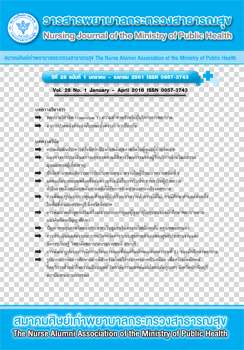Relationships between Protective Factors and Resilience among Schizophrenia Caregivers*
Main Article Content
Abstract
พลังสุขภาพจิตในผู้ดูแลผู้ป่วยจิตเภทมีความเกี่ยวข้องกับปัจจัยปกป้องหลากหลายปัจจัย การวิจัย เชิงพรรณาวิเคราะห์ความสัมพันธ์นี้ มีวัตถุประสงค์เพื่อศึกษาพลังสุขภาพจิตของผู้ดูแลผู้ป่วยจิตเภท และ ความสัมพันธ์ระหว่าง การมองโลกในแง่ดี ทัศนคติของผู้ดูแลต่อผู้ป่วยจิตเภท ความสามารถของผู้ดูแลใน การดูแลผู้ป่วยจิตเภท การสนับสนุนทางสังคม กับพลังสุขภาพจิตของผู้ดูแลผู้ป่วยจิตเภท กลุ่มตัวอย่าง คือ ผู้ดูแลหลักผู้ป่วยจิตเภทในจังหวัดนนทบุรี จำนวน 97 ราย เครื่องมือวิจัย ได้แก่ แบบสอบถามข้อมูลส่วนบุคคล การมองโลกในแง่ดี ทัศนคติของผู้ดูแลต่อผู้ป่วยจิตเภท ความสามารถของผู้ดูแลในการดูแลผู้ป่วยจิตเภท การสนับสนุนทางสังคม และพลังสุขภาพจิต มีค่าความเชื่อมั่นสัมประสิทธิ์อัลฟาของครอนบาคเท่ากับ .89, .81, .94, .87, .89 ตามลำดับ วิเคราะห์ข้อมูลโดยใช้สถิติเชิงพรรณา สัมประสิทธิ์สหสัมพันธ์ของเพียร์สัน
ผลการวิจัย พบว่า ผู้ดูแลผู้ป่วยจิตเภทมีพลังสุขภาพจิตโดยรวมอยู่ในระดับปกติ มีค่าคะแนนเฉลี่ย 62.53 (SD=10.85) จากการวิเคราะห์หาความสัมพันธ์ พบว่า การมองโลกในแง่ดี ทัศนคติของผู้ดูแลต่อผู้ป่วยจิตเภท ความสามารถของผู้ดูแลในการดูแลผู้ป่วยจิตเภท การสนับสนุนทางสังคม มีความสัมพันธ์ทางบวกระดับปานกลางกับพลังสุขภาพจิตอย่างมีนัยสำคัญทางสถิติที่ระดับ .001 (r=.69, r=.33, r=.41, r=.43ตามลำดับ)
จากผลการศึกษา บุคลากรทางสุขภาพควรส่งเสริมสนับสนุนให้ผู้ดูแลผู้ป่วยจิตเภทได้รับปัจจัยปกป้องพลังสุขภาพจิต คือ การมองโลกในแง่ดี ทัศนคติของผู้ดูแลต่อผู้ป่วยจิตเภท ความสามารถของผู้ดูแลในการดูแล ผู้ป่วยจิตเภท การสนับสนุนทางสังคม เพื่อช่วยลดความเครียด เพิ่มความทนทานต่ออารมณ์ทางลบ เกิดขวัญและกำลังใจ และสามารถจัดการกับปัญหาได้
Article Details
บทความและรายงานวิจัยในวารสารพยาบาลกระทรวงสาธารณสุข เป็นความคิดเห็นของ ผู้เขียน มิใช่ของคณะผู้จัดทำ และมิใช่ความรับผิดชอบของสมาคมศิษย์เก่าพยาบาลกระทรวงสาธารณสุข ซึ่งสามารถนำไปอ้างอิงได้
References
2. Laytrakul M, Sukkhan P. Schizophrenia and other psychiatric disorders. 2th ed Bangkok: Beyond Enterprise; 2552. (in Thai).
3. Udomrat P, Wikansanont S. Schizophrenia Textbooks. Songkhla: Suburban printing; 2552. (in Thai).
4 Chou KR. Caregiver burden: A concept analysis. Journal of Pediatric Nursing. 2000;15(6):389-407.
5. Zauszniewski JA, Bekhet AK. Resilience in family members of persons with serious mental illness. Nursing Clinics of North America. 2011;45:770-80.
6. Department of Mental Health. Change bad thing become good: Resilience quotient. [internet]. [cited 2015 December 12]. Available from: hpp://wwwdmh.moph.go.th/ main.asp.
7. Dyer JG, McGuinness TM. Resilience: Analysis of the concept. Archivesof Psychiatric Nursing. 1996;10:276-82.
8. Rutter M. Resilience: Some conceptual considerations. Journal of Adolescent Health. 1993;14:598-611.
9. Carver CS, Scheier MF. Dispositional optimism. Trends in Cognitive Sciences. 2014;18, 293–9.
10. Chang EC, Lawrence S.J. Optimism pessimism and positive and negative affectivity in middle-aged adults: A test of cognitive affective model of psychological adjustment. Psychology and Aging 2011;16:524-30.
11. Praisawat R. Family member role for home care of schizophrenia patients. [Thesis]. Phitsanulok: Naresuan Univertity; 2007. (in Thai).
12. Orem DE. Nursing concept of practice. 6th ed. St.Louis: Mosby-year book: 2001.
13. Kumpfer Karol L. Factors and processes contributing to resilience the resilience framework. resilience and development: Positive Use Adaptation, edited by Glantz and Johnson. Kluwer Academic Pienum Publishers New York. Nursing Forum.1999;42(2) 73-82.
14. Khueanman I. Mental health and dependent care agency among mothers of autistic children. [Thesis]. Nakhon Ratchasima: Nakhon ratcha sima rajanagarindra psychiatric hospital; 2004. (in Thai).
15. Harabutra T. Selected factors related to resilience quotient of schizophrenic patients caregiver in community. [Thesis]. Bangkok: Chulalongkorn University; 2012. (in Thai).
16. Scott EW, Beth C. Perceived stress and resilience in Alzheimer,s Disease caregiver : Testing moderation and mediation models of social support. Aging & mental Health.Does 2008;12 (3)357-65.
17. Maturapodpong S. Hope, optimism, and resilience as predictors of performance, job satisfaction, work happiness, and organizational commitment. [Thesis]. Bangkok: Chulalongkorn University; 2012. (in Thai).
18. Scheirer MF, Carver CS. Optimism, Coping and health: Assessment and implication of generalized outcome expectancies. Health Psychology.1985;4:219-47.
19. Kaewpila N. Dependent care ability among caregivers of persons with schizophrenia in relative participatory care project at Suanprung Psychiatric Hospital. [Thesis]. Chiangmai: Chiangmai University; 2008. (in Thai).
20. Cobb S. Social support as a moderator of life stress. Psychosomatic Medicine 1976;38:300-11.
21. Schaefer C, Coyne JC. The health related functions of social support. Journal of Behavioral medicine 1981;4:381-406.
22. Glubvong M. Factors affecting burnout and care behavior of caregivers of schizophrenia patients. [Thesis]. Bangkok: Chulalongkorn University; 2014. (in Thai).
23. Lopez J, Romero-Moreno R, Marquez- Gonzalez M, Losada A. Anger and health in dementia caregiver: Exploring the mediation effect of optimism stress & health: Journal of the International Society for the Investigation of Stress 2015;31:158-65.
24. Grant C, Ballard ED, Olson-Madde, Jennifer H. An Empowerment approach to family caregiver involvement in suicide prevention: Implications for practice. Family Journal. 2015;23:295-304.
25. Harmell AL, Chattillion EA, Roepke SK, et al. A review of the psychobiology of dementia caregiving: A focus on resilience factors. Current Psychiatry Reports. 2011;13:219-24.
26. Stuart GW. Principles and practice of psychiatric nursing. 9 th ed. St.Louis: Elsevier Mosby-year book: 2009.
